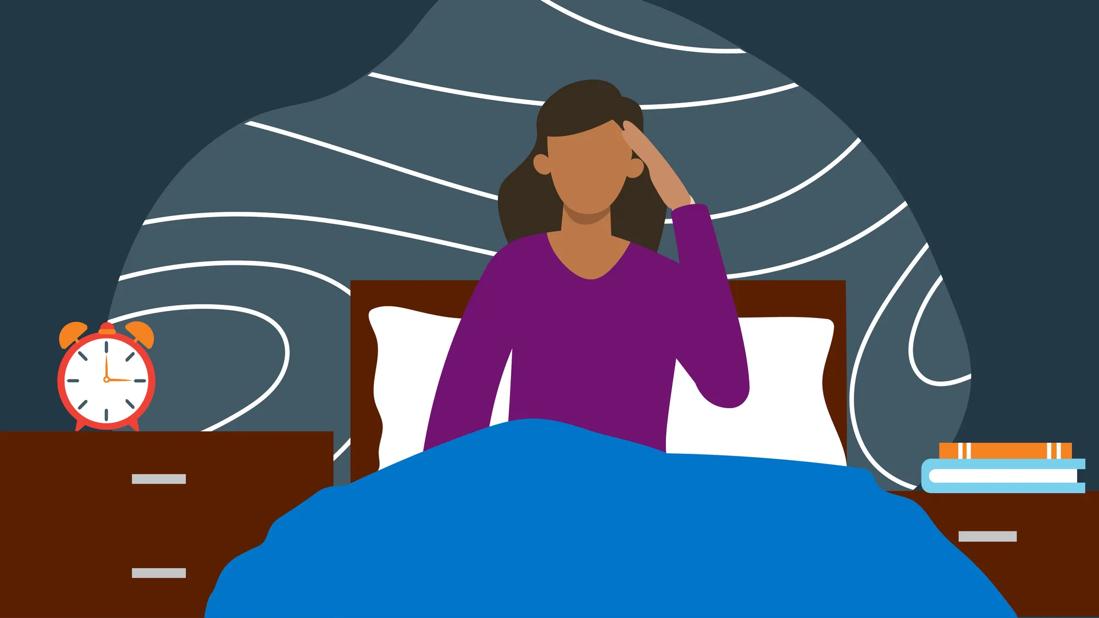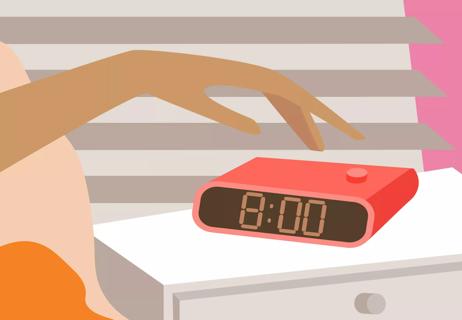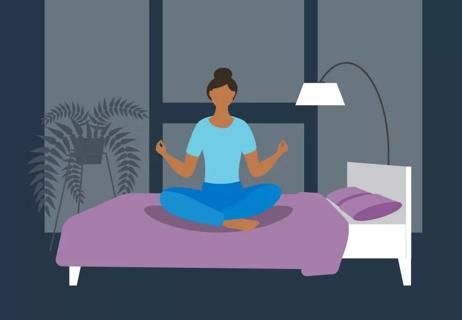Pain, light exposure and anxiety are just a few factors that could be waking you up in the middle of the night

Next time you wake from a sound sleep and roll over to see those familiar numbers on the bedside clock, know that you’re not alone. Nighttime awakenings are a common phenomenon.
Advertisement
Cleveland Clinic is a non-profit academic medical center. Advertising on our site helps support our mission. We do not endorse non-Cleveland Clinic products or services. Policy
But what’s going on?
“For adults who go to sleep at standard times — say, 10 p.m. or so — 3 a.m. is typically when you’re in REM sleep,” says sleep medicine specialist Nancy Foldvary-Schaefer, DO. REM is the lightest stage of sleep.
From bathroom breaks to racing thoughts, Dr. Foldvary-Schaefer discusses common causes of late-night awakenings and how to get a handle on them.
Even while you’re asleep, your body is hard at work breaking down what you ate and drank that day. That’s why it’s natural to wake up needing to go to the bathroom once in a while, especially if you had a tall glass of water close to bedtime. But if it becomes too common, it could be a sign of nocturia.
What to do about it: Limit fluids before bed to see if that puts your late-night bathroom breaks to rest. If not, talk to a healthcare provider to see if you could be dealing with an underlying issue.
That street light shining into your bed could be doing more harm than you realize. Even if you can fall asleep in a bright room, your brain may have trouble staying asleep.
“Light exposure at night is absorbed through our eyes into our retina, and our brain starts to think it’s daytime because we’re in a well-lit environment,” Dr. Foldvary-Schaefer explains.
Advertisement
What to do about it: Go as dark as possible with blackout curtains or a sleep mask.
Maybe it’s an ambulance siren blaring, a neighbor’s radio blasting or your roommate watching TV down the hall.
“External sleep disturbances can cause you to wake in the middle of the night,” Dr. Foldvary-Schaefer says. “It’s more likely to happen very early in the morning, as you’re coming out of REM sleep.”
What to do about it: Cultivate quiet with a white or pink noise machine (or app) or a good set of earplugs.
Sometimes, it’s not about outside distractions but internal ones.
All these factors can be temporary, but if untreated, they can snowball into sleep disorders.
What to do about it: Everyone gets overwhelmed or sad once in a while, but chronic stress, anxiety and depression can have profound effects. If they keep you from sleeping through the night, reach out to a healthcare provider.
A midday catnap can feel soooo good … until you wake up for no apparent reason in the middle of the night.
“Naps can undermine your nighttime sleep,” Dr. Foldvary-Schaefer warns. “For most people, avoiding napping during the day will lead to better quality sleep at night.”
What to do about it: If you work nights or have a condition like hypersomnia, naps may be necessary for your health. Otherwise, try to avoid them during the day. If you must nap, do so for no longer than 20 minutes.
Your sleeping position can cause or worsen overnight pain. Other types of pain that may wake you up at night include:
What to do about it: Adjusting your sleep position may help. But if pain causes frequent wakeups, ask your provider about more comprehensive pain management options.
Did you know that your sleep patterns change as you get older? More than half of adults over 65 report having at least one type of recurring sleep problem.
Age-related factors that can interrupt sleep include:
Advertisement
“As we get older, our sleep rhythms get a bit more fragile,” Dr. Foldvary-Schaefer confirms. “So, it becomes more important than ever to develop soothing rituals around falling asleep.”
What to do about it: Go to bed and wake up at the same time every day, even without a work schedule to guide you. And adopt a calming nighttime routine that primes you for sleep. If a health condition is behind your late-night wakeups, consider seeing a geriatrician for specialized guidance.
Don’t be fooled by the idea of a nightcap to help you sleep. Drinking alcohol before bed can disrupt your sleep cycle and leave you more tired than ever.
“Alcohol helps you fall asleep, but sleep is very fragmented afterward,” Dr. Foldvary-Schaefer explains.
What to do about it: Have your last drink at least three hours before you hit the hay.
Sometimes, nighttime awakenings rise to the level of sleep disorders.
“Most sleep disorders are defined as having symptoms for at least three months,” Dr. Foldvary-Schaefer says. “But in reality, most people who come to a sleep disorder expert have had symptoms for years.”
Regular nighttime wakeups can be a symptom of conditions like:
Advertisement
What to do about it: Only a healthcare provider can diagnose a sleep disorder — and then help you figure out how to manage it. Start with your regular provider or look for a sleep specialist.
Some people think waking up at 3 a.m. has deeper spiritual meaning, but hey, that’s not the domain of sleep medicine. Here’s what we do know: There’s likely a scientific reason for your nighttime awakenings — yes, even if you seem to wake up to the exact same numbers on the clock each night.
Bodies can be surprisingly predictable in this way, Dr. Foldvary-Schaefer says. “At one point, you may have had a reason to wake up at that time, like in response to sleep apnea or a crying baby. Your body can become conditioned to it.”
Next time you wake up at 3 a.m. (or whenever), give yourself 15 to 20 minutes to doze back into dreamland. But if you’re awake longer than that, get out of bed instead.
“When you’re feeling frustrated that you can’t fall back to sleep, it’s best not to keep lying in bed awake,” Dr. Foldvary-Schaefer advises. “Bed should be a pleasant place to be — but that’s not how it feels when your brain is wide awake, worrying and wondering when you’ll fall asleep again.”
Instead, get up and do something that promotes sleep:
Advertisement
These activities help you relax, shutting off your fight-or-flight response, and activating a “rest-and-digest” response instead. When you feel sleepy again, head back to bed.
Whatever you do, just don’t use your cell phone, check email or use any other electronic devices, as blue light signals to your brain that it’s time to wake up.

Sign up for our Health Essentials emails for expert guidance on nutrition, fitness, sleep, skin care and more.
Learn more about our editorial process.
Advertisement

Stress, alcohol, sleep apnea and (you guessed it!) scary movies are a few common causes of bad dreams

It’s normal to oversleep occasionally, but sometimes, there might be an underlying cause

Tame racing thoughts with breathing exercises, screen time limits and connecting to your body

How this common sleep problem causes confusion and strange behavior upon waking

Signs, causes and ways to address this problem

Tips for readjusting your sleep cycle

To avoid sleep deprivation and shift work sleep disorder, try adopting habits that minimize light exposure and prioritize daytime sleep

Sleep disorders, mental health conditions and other health concerns can all affect the quality of your sleep

Even small moments of time outdoors can help reduce stress, boost mood and restore a sense of calm

A correct prescription helps your eyes see clearly — but as natural changes occur, you may need stronger or different eyeglasses

Both are medical emergencies, but they are very distinct events with different causes